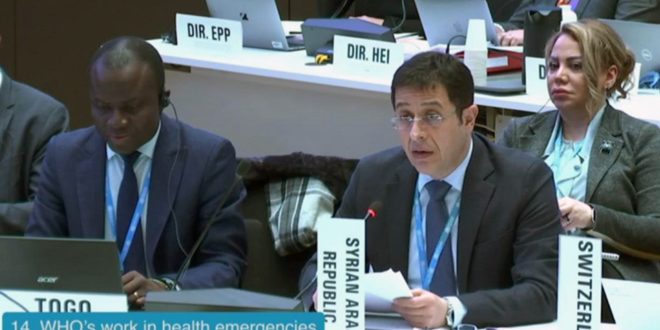The activities of the 154th session of the Executive Council of the World Health Organization, held in Geneva, Switzerland, with Syrian participation, will continue until the 27th of this month.
In a statement by the Syrian Arab Republic on behalf of the member states of the Eastern Mediterranean Region regarding the organization’s work in the field of health emergencies, read by the Minister of Health, Hassan Al-Ghabbash, it was stated that the region has suffered from multiple emergencies over the years, noting that last year was the worst ever as a result of earthquakes. The horrific disaster that struck Afghanistan, Morocco, and Syria claimed thousands of lives. Floods also swept through Libya, and drought struck Somalia, causing tens of thousands of deaths among children, which could have been avoided.
Al-Ghabbash explained that the World Health Organization documented 73 disease outbreaks during the past year, which is double the number that was documented during the year 2021, in an ongoing continuation of disease outbreaks and epidemics of measles, cholera, and dengue fever, and this matter is nothing but a reflection of the deterioration of health systems due to conflicts and climate change.
Al-Ghabbash pointed out that the most disturbing crises at the present time are what the occupied Palestinian territories are witnessing, and what Sudan is experiencing, as relief workers in Gaza are witnessing the harshest and most severe conditions with the escalation of violence, while aid agencies are struggling to provide assistance, and more than 23,000 people have been lost. Gazans lost their lives while about 50,000 people were injured, while events in Sudan led to the displacement of a large number of people.
Al-Ghabbash explained that the World Health Organization documented 73 disease outbreaks during the past year, which is double the number that was documented during the year 2021, in an ongoing continuation of disease outbreaks and epidemics of measles, cholera, and dengue fever, and this matter is nothing but a reflection of the deterioration of health systems due to conflicts and climate change.
Al-Ghabbash pointed out that the most disturbing crises at the present time are what the occupied Palestinian territories are witnessing, and what Sudan is experiencing, as relief workers in Gaza are witnessing the harshest and most severe conditions with the escalation of violence, while aid agencies are struggling to provide assistance, and more than 23,000 people have been lost. Gazans lost their lives while about 50,000 people were injured, while events in Sudan led to the displacement of a large number of people.
Al-Ghabbash added: “The world lost its moral compass when it failed to impose a permanent ceasefire in these two wars,” noting that the world should feel ashamed when it is faced with the heroic courage and great sacrifices shown by health workers on the front lines in Gaza, Sudan, and others.
Al-Ghabbash praised the effectiveness of the response of the World Health Organization and its member states, noting that this response is not sufficient without political solutions, peace processes, actions on climate action, health security, and commitment to common humanity.
Al-Ghabbash praised the effectiveness of the response of the World Health Organization and its member states, noting that this response is not sufficient without political solutions, peace processes, actions on climate action, health security, and commitment to common humanity.
NR

